#eileithyia goddess
Text
An epithet of Eileithyia is Genetyllis, which means procreation, in which her role is over sexual intercourse for the purpose of producing children. It makes me wonder, does this role mean she can tell if a child was violently conceived? Would it affect her relationship with her father/uncles/brothers?
The male gods sexual violence is barely an open secret on Olympus I’m sure but Eileithyia’s job is to soothe the pain of women going through the most traumatic and life changing experience a person could go through, so while she is definitely not a “nice” goddess (especially with Alcmene) her job makes her intimately familiar with these women’s suffering and it would affect her wether she wants it to or not.
There is also this one myth where she helps one of Apollo’s lovers give birth at his request and I imagine that’s a common occurrence, where her male relatives ask her to help with the birth of their children.
#I fuck with the idea that Eileithyia is just as cruel and apathetic as the other gods can be#but her job forces her to have more empathy for women#I wonder what her relationship with Zeus is#greek mythology#ancient greek mythology#greek pantheon#zeus#hera x zeus#zeus hater#anti zeus#zeus deity#zeus greek mythology#eileithyia goddess#eileithyia#epithet#headcanons
22 notes
·
View notes
Text
Greek Gods 101: Eileithyia
Eileithyia is a goddess of childbirth and labor pains. Excluding the universal offerings, some common offerings include:
Eggs
Egg Imagery
Warm Water
Calming Scents
Depictions of Rabbits
Flowers
Baby Blankets
Pain Medications
Depictions of Bottles
Milk
Baby Food
For devotional acts, some activities that can be done for her include:
Learning About Pregnancy
Learning About Pregnancy Prevention & Treatment
Taking Care of Children
Learning About Midwifery
Learning About Baby-Naming Ceremonies or Rituals
Feeding Children (babies especially)
Learning About the Birth and Labor Process
Learning About Birth Methods
She is not celebrated in any Athenian holidays.
#eileithyia#eileithyia goddess#eileithyia deity#deities#hellenism#helpol#hellenic#hellenic pagan#hellenic polytheism#hellenic community#hellenic polytheist#hellenic deities
31 notes
·
View notes
Text

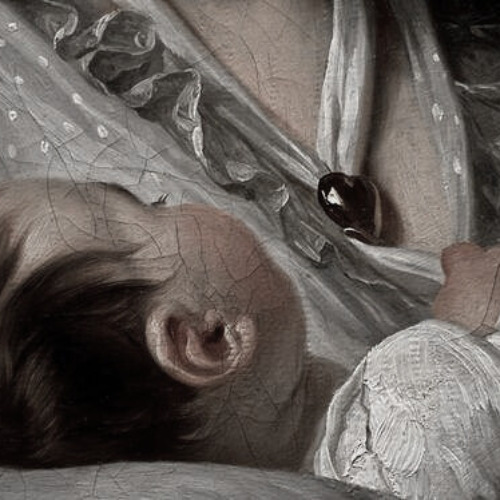
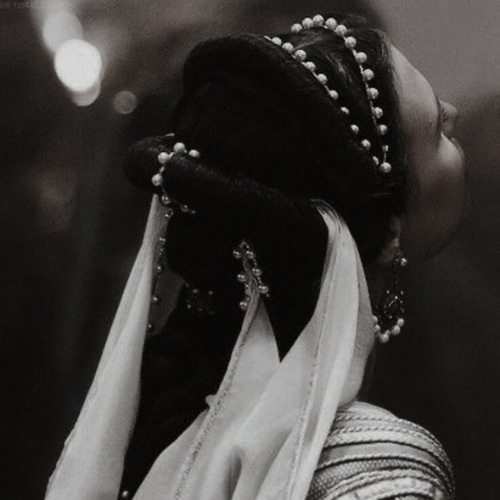






greek mythology: eileithyia
eileithyia is the goddess of childbirth and labour pains. according to some there were two eileithyiai: one who furthered birth and one who protracted the labour.
#greek mythology#eileithyia#gods and goddesses#greekmythologyedit#greekmythedit#mythologyedit#*mine*
144 notes
·
View notes
Text

Here we finally have my finalised designs of the divine children of Zeus, Hades and Poseidon.
I wanted to combine their sacred animals into their designs, though some have the sacred animals of their parents because they didn’t have any themselves.
#greek gods#my art#greek mythology#mythology#greek myths#Hermes#artemis and apollo#artemis#Apollo#Athena#ares#ares deity#ares god of war#zagreus#melinoe#makaria#triton#hepheastus#Dionysus#greek goddess enyo#enyo greek mythology#enyo#eileithyia#hebe#apollo greek mythology#greek god apollo#greek god hermes#greek goddesses#greek goddess#greek pantheon
69 notes
·
View notes
Text
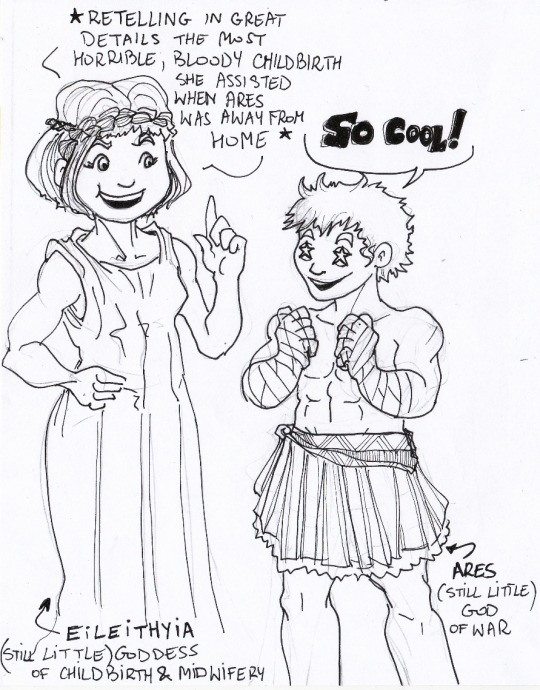
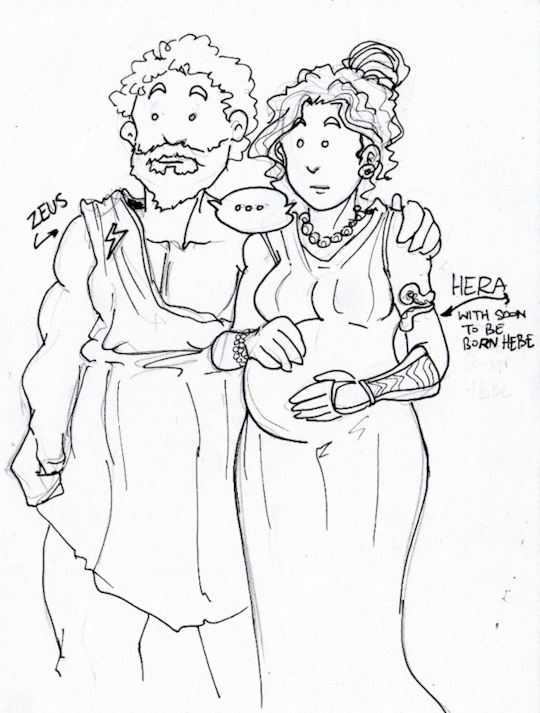

Kid Eileithyia, kid Ares and very concerned Zeus & Hera
<picture #1>
Eileithyia (still little) goddess of childbirth & midwifery: *retelling in great details the most horrible, bloody childbirth she assisted, when Ares was away from home*
Ares (still little) god of war: SO COOL!
<picture #2>
Concerned Zeus and pregnant Hera: ...
<picture #3>
Zeus (to still unborn Hebe): Hebe? It's me, Zeus, your father - please, don't be like your siblings! You hear me? BE NORMAL!
Hera (to still unborn Hebe): Yes baby, listen to your father!
#Eileithyia#ares#zeus#hera#hebe#greek gods#greek mythology#but not in serious way XD#cienie's art#listen we all can agree that hebe is the only one kid of zeus and hera loved and liked by both parents right?#also i'm totally here for Eileithyia & Ares friendship#because c'mon he is bloodlust god of war and she is goddess of chilbirth and childbirth is pretty terryfing thing to deal with#not like poetry or science/wisdom or plants#it is a battle to get out a baby from safe womb into cruel world etc etc#of course Ares & Eileithyia get along surprisingly well (at least in my head XD)
48 notes
·
View notes
Note
Yes, of course, Artemis is cool and Arrest and Hephaestus would certainly protect her. But... why does everyone forget about the daughters of Hera? Hebe, Eilithia, Enyo and in some cases Eris.If we talk about the sisters of Olympus, then they MUST be there, and not just Athena-Persephone-Artemis. Why not let Artemis take care of outdoor walks for Hebe, her only youngest.
My apology for the forgetfulness of Hera's girls.

As repentance, I shall make more headcanons about Artemis with Hebe, Eileithyia, and Enyo (I mostly see Eris as Nyx's daughter, so I'm leaving her out)
Artemis is a bit resentful of Eileithyia for not helping her mother give birth to her and Apollo. But as she matured, Artemis understood that Eileithyia had to obey Hera.
Their relationship improved when Eileithyia became Artemis' mentor in pregnancy and midwiving.
Artemis was naturally protective of Hebe, who was the youngest of the second generation.
Hebe didn't witness Hera and Artemis' fight in the Trojan War, but she did see the injuries on Artemis later and was extremely worried. Hebe secretly brings Artemis first aid to bandage herself (behind Hera's back because Hebe can still sense her mother's dislike of big sis Artemis)
As much as Artemis resented Hera, she couldn't bring herself to tell Hebe the truth, so she opted to lie about her bruises: "I tripped and fell earlier. But I'm fine now, don't worry!"
Artemis hid a lot of things from Hebe about the darker nature of the gods, not wanting to ruin her innocence. Artemis, Eileithyia, and even Iris tried their best to keep Hebe away from Hera and Zeus whenever they broke into fights.
Artemis and Enyo didn't interact much in the myths but might bond over warfare. Artemis taught Enyo advanced archery, while Enoy trained Artemis in direct combat.
Artemis and Enyo were Ares' little feral sisters. When they sparred, Ares had to supervise them to ensure they didn't escalate into intentional homicide.
Unlike Hebe, Enyo knew Artemis was beaten by Hera in the war. She snuck to Artemis afterward to laugh at her: "Did you really think you can take on my mother? You're crazy!"
Eileithyia, Hebe, and Enyo could have hung out with Artemis even more if it wasn't for Hera. But over time, Hera's hatred for Artemis and Apollo lessened, and the girls would grow closer without barricade.
#artemis#eileithyia#hebe#enyo#greek goddesses#greek deities#headcanons#sibling shenanigans#ask me anything#anon ask#tumblr ask#i know there's a lot of bad Hera moments in here#but understand that she's worried for her daughters too#who would want your kids to hang out with your husband's illegitimate children?#Hera will be less strict with her daughter's associate with Artemis#honestly i was sleeping on Artemis' potential friendship with Eilei Hebe and Enyo a lot#thank you anon for redirecting me to them
17 notes
·
View notes
Text
Zeus and Heras Kids Oldest to Youngest HC :)
Ares [God of War, Courage and Bloodlust]
|
Twins
|
Enyo [Goddess of War and Bloodlust]
Eileithyia [Goddess of Childbirth, Labor Pains and Midwifery]
Eris [Goddess of Strife and Discord]
Hephaestus [God of Blacksmiths, Fire and Forge]
|
Son of Hera Only
|
Angelos [A Chthonic Deity]
Hebe [Goddess of Eternal Youth]
#ares#enyo#eileithyia#eris goddess of chaos#hephaestus#hebe#zeus#hera#zeus and hera#greek mythology#greek gods#myths#greek myth#olympus gods#god of war#greek gods and goddesses#headcanon
41 notes
·
View notes
Text
Character Intro: Eileithyia (Kingdom of Ichor)








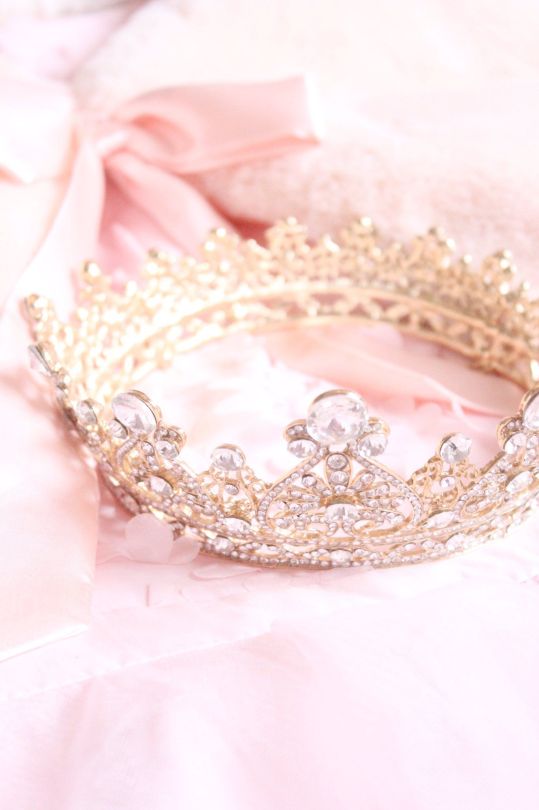
Nicknames- Ms. Know-It-All by Hebe
Princess by Hera
Ella by the other gods
Age- 14 (immortal)
Location- Queenstown district, New Olympus
Personality- She's very self-sufficient and confident. She can also be a bit too serious at times. She favors her mom in terms of their personalities and they are very close. Ella often does and follows whatever her mother tells her.
Since her parents’ separation, she splits her time between the palace on Mt. Olympus & her mother's townhouse. Her relationship with her father Zeus (god of the sky, thunder, & lightning) is extremely strained, especially after catching him with one of his girlfriends after promising to meet her for dinner. At the townhouse she has a new pet- a newborn polecat. Ella hasn't decided on a name yet.
Ella is the goddess of childbirth and midwifery. She’s the youngest licensed midwife! Her abilities include cleaning inducement, manipulating labor contractions, having an innate sense when a person goes into labor, being able to pinpoint the moment of conception, having an innate sense of the baby's gender, communicating with animals that are sacred to her mom (like cows & peacocks), and the power of flight (though she doesn't have wings). She can also generate strong wind currents when emotional.
She's not really close with most of her half-siblings, except Dionysus (god of wine) and sometimes Artemis (goddess of the hunt & moon). She's curious about her brother Hephaestus (god of the forge).
Ella keeps her dark brown hair in a simple and chic bob. Her favorite hair products are the Glory's Crown black vanilla hydrating spray & the Hairology soap free shea butter shampoo bar.
Ella attends an exclusive private school in the city. Her best friends are Eunomia (goddess of law & legislation) and Eirene (goddess of peace), who are also in the same grade. One student in the school the three of them avoid like the plague is Circe (goddess of sorcery). Other godly schoolmates include a new student Theodon (god of reality, uncertainty, & fate), Telesphorus (Rusty) (god of rehabilitation), Heimarmene (Marnie) (goddess of shared fate), Dysnomia (goddess of anarchy & lawlessness), Eiresione (Ren) (goddess of offerings), Koalemos (god of foolishness), Philautia (goddess of self love), Circe (goddess of sorcery), Eleos (Ellie) (goddess of mercy, pity, & compassion), and Cedalion (demi-god of smithing ore). She hasn't admitted this to her friends, but Ella's secretly jealous of the newest student & up-and-coming deity, Morá (goddess of babies & children).
In the pantheon, Ella also really likes Themis (Titaness of justice), Iris (goddess of the rainbow), Demeter (goddess of the harvest & agriculture), Hestia (goddess of the hearth), and Philyra (goddess of paper, perfume, & beauty). She's also a secret follower of Aphrodite (goddess of love & beauty) on Fatestagram.
One of her favorite treats are white chocolate covered strawberries! She also likes the creme brulee cookies from Hollyhock's Bakery.
Her go-to drink is a vanilla almond cookie smoothie with extra whipped cream & ambrosia honey from The Frozen Spoon. She also likes lemonade, steaming hot chrysanthemum tea, coconut water, lemon-lime soda, peach iced tea, and sparkling water. Her mom allowed her once to try a cosmopolitan as well as getting a few sips of champagne!
She’s never kissed a boy or gone on a date.
Ella is excited about stopping aging physically when she turns sixteen (the legal age of adulthood in Olympius). She hopes to become an official member of the Olympic Council. She’s also hopeful about falling in love, getting married, and producing heirs.
Her favorite food is a chicken souvlaki pita wrap (with extra mayo) and she also likes her mom's samosas, butter chicken with white rice, & tandoori chicken.
For work, she's currently a junior intern at her mom's Luxuria fashion brand. Ella also sometimes work at the makeshift Olmorfia store in the Queenstown neighborhood- the perks being the giftcards worth 500 drachmas!
Her other favorite desserts from Hollyhock's Bakery are the madeleines and sugar cookies! She also likes when her mom makes kulfi- a frozen custard made with sweet condensed milk, heavy whipping cream, sugar, saffron, cardamom, & pistachios.
Ella is an often companion to her mother Hera (goddess of women & marriage) when she's required to go to weddings, a frequent guest also being Naeus (god of weddings); that she used to have a crush on. Her favorite wedding she's been to thus far was Chiron (the immortal centaur) and Paean (goddess of physicians).
She hopes to get a blush pink sports car on her 16th birthday & she also has dreams of following in her mother's footsteps with having a fashion label of her own.
In her free time, Ella enjoys shopping, hosting tea parties, going to the spa, going to the movies, reading, writing, sunbathing, drawing her own designs, swimming, yoga, baking, doing make-up, and spending time with family members that she likes.
"The best kind of power is the quiet type."
#my oc#eileithyia#my oc character#my character#oc character#oc intro#character intro#oc introduction#character introduction#modern greek gods#modern greek mythology#greek myth retellings#greek goddess#greek goddesses#greek mythology#greek pantheon
7 notes
·
View notes
Text
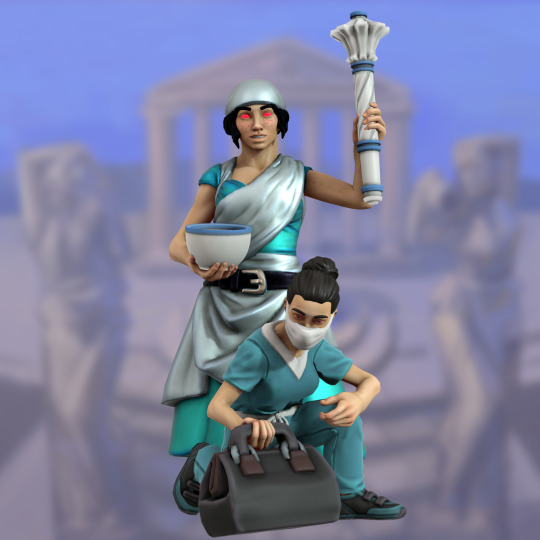
Goddess of Childbirth and Midwifery, Eileithyia stands present at the beginning of every life.
1 note
·
View note
Text
Statistics of Apollo's Lovers
I was wondering just how unfortunate of a love-life our boy Apollo had, so - as one does - I did the research, math, and writing of said love-life.
such is the life of an adhd teen :)
In total, there are 59 people on this list. I have them separated into eight groups; Immortal, Immortal & Rejected, Lived, Died, Rejected & Died, Rejected & Cursed, Rejected & Lived, and who were Rejected by Apollo
Disclaimer: I am not a historian nor an expert in Greek Mythology, I am just a very invested nerd in Mythology, and in Apollo's mythology in general, and got curious about what his rap sheet actually looks like.
Sidenote: There will be some "lovers" not on this list. Reasons being;
No actual literary sources behind them
Said literary sources are dubious at best
Not enough information is given about the nature of their relationship to make an accurate take
So if somebody isn't on this list, it's because of one of those three reasons. Although there is still a chance I missed somebody! :)
Also, no RRverse lovers include in this list. Sorry my fellow ToA fans.
(Edited 04/29/24 - Currently adding in sources/references/expanding on the myths themselves. bare with me lol)
Let's begin! :D
Immortal Lovers
Calliope: muse of epic poetry. Mother of Hymenaios and Ialemus by Apollo.
Clio: muse of history
Erato: muse of love poetry
Euterpe: muse of music
Polyhymnia: muse of hymns/sacred poetry
Melpomene: muse of tragedy
Thalia: muse of comedy. Mother of the Corybantes by Apollo.
Terpsichore: muse of dance
Urania: muse of astronomy
Boreas: the North Wind. yes Apollo dated the North Wind. Who knew? It's mentioned in the Argonautica by the Boreads - they call Apollo "beloved of our sire" so...hmm. wonder what happened there because that's all we get.
10 lovers total here.
9 Female, 1 Male
Immortal & Rejected
Hestia: goddess of the Hearth
1 Interest. Female.
Lovers Who Lived:
Branchus: mortal shepherd, gifted prophecy
Rhoeo: mortal princess, eventually married an apprentice of Apollo
Ourea: demigod daughter of Poseidon, dated Apollo during his punishment with Laomedon; had a son named after the city of Troy
Evadne: nymph daughter of Poseidon, Apollo sent Eileithyia & (in some texts) the Fates to aid in their son's birth
Thero: great-granddaughter of Heracles, described as "beautiful as moonbeams"
Cyrene: mortal princess-turned-nymph queen, kick-ass lion wrangler, and mother of two of Apollo's sons - Aristaeus (a god) and Idmon (powerful seer)
Admetus: mortal king, took great care of Apollo during his second punishment, Apollo wingmanned him for Alcestis's hand - basically Apollo doted on him <3
Hecuba: queen of Troy, together they had Troilus.
It was foretold that if Troilus lived to adulthood, Troy wouldn't fall - unfortunately, Achilles murdered Troilus in Apollo's temple. When the Achaeans burned Troy down, Apollo rescued Hecuba and brought her to safety in Lycia.
Hyrie/Thyrie: mortal. mothered a son by Apollo. Their son, Cycnus, attempted to kill himself after some shenanigans and his mother attempted the same. Apollo turned them into swans to save their lives.
Dryope: mortal. had a son named Amphissus with Apollo, who was a snake at the time. Later turned into a lotus flower, but it had nothing to do with Apollo so she's still on this list. (noncon; written by Ovid in Metamorphoses)
Creusa: mortal queen. had a son named Ion with Apollo. Please check out @my-name-is-apollo's post for more details because they make some good points about what's considered "rape" in Ancient Greece.
Melia: Oceanid nymph. Had a son w/h Apollo named Tenerus. will expand on her in a bit
Iapis: a favorite lover. Apollo wanted to teach him prophecy, the lyre, ect. but Iapis just wanted to heal :) so Apollo taught him healing :)
Aethusa: daughter of Poseidon & the Pleiad Alcyone. Mother of Linus and Eleuther. She is the great-great grandmother of Orpheus.
Acacallis: daughter of King Minos. there's a lot of variation on whether or not she had kids with Hermes or Apollo. Some say she had a kid with each.
Chrysothemis: nymph queen who won the oldest contest of the Pythian Games - the singing of a hymn to Apollo. She had three daughters, and one of them is said to be Apollo's.
Corycia: naiad. had a son with Apollo. the Corycian Cave north of Delphi is named after her
Leuconoe (also Choine or Philonis): daughter of Eosphorus, god of the planet Venus, and mother of the bard Philammon.
Melaena (also Thyia or Kelaino): mother of Delphos, member of prophetic Thriae of Delphi. Priestess of Dionysus.
Othreis: mothered Phager by Apollo, and later Meliteus by Zeus.
Stilbe: mother of Lapithus and Aineus by Apollo.
Syllis (possible same as Hyllis, granddaughter of Heracles): mothered Zeuxippus by Apollo.
Amphissa: Apollo seduced her in the form of a shepherd. They had a son named Agreus.
Aria (or Deione): had a son named Miletus. Hid him in some smilax. Her father found him and named him.
Arsinoe: she and Apollo had a daughter named Eriopis.
Queen of Orkhomenos (no name is given): Mother of Trophonius (my fellow ToA fans will recognize that name haha).
Hypermnestra: Either Apollo or her husband fathered her son Amphiaraus. (sidenote: @literallyjusttoa suggested that Apollo was dating both Hypermnestra and Oikles, and I, personally, accept that headcannon)
Manto: Daughter of Tiresias. Apollo made her a priestess of Delphi. They had a son named Mopsus. When Apollo sent her to found an oracle elsewhere, he told her to marry the first man she saw outside of Delphi. That man turned out to be Rhacius, who brought her to Claros, where she founded the oracle of Apollo Clarios. Later, another man named Lampus attempted to assult her, but was killed by Apollo. She is also said to be a priestess who warned Niobe not to insult Leto, and to ask for forgiveness. Niobe did not.
Parthenope: granddaughter of a river god. Mothered Lycomedes by Apollo
Phthia: prophetess. called "beloved of Apollo". Mother three kings by him; Dorus, Laodocus, & Polypoetes
Procleia: Mother of Tenes, son of Apollo, who was killed by Achilles before the Trojan War. Daughter of King Laomedon, king of Troy.
Helenus: prince of Troy. Received from Apollo an ivory bow which he used to wound Achilles in the hand.
Hippolytus of Sicyon: called "beloved of Apollo" in Plutarch Life of Numa. I don't think this guy is the same as the Hippolytus, son of Zeuxippus (son of Apollo), king of Sicyon Pausanias talks about in his Description of Greece. That would be a little weird taking the whole family tree into account - though it's never stopped Zeus before, I guess.
Psamathe: nereid, said to be the personification of the sand of the sea-shore. There are two versions of her myths, both very different, but I'll only explain the one that explicitly states her and Apollo's relationship, which is by Conon's Narrationes. She and Apollo were lovers, but never had any kids. When another man assaulted her, she had a son and abandoned him. (He was found by some shepherds dw - wait, he was then torn apart by dogs. Nevermind.). Back to her, her father ordered for her to be executed and Apollo avenged her death by sending a plague onto Argos and refused to stop it until Psamathe and Linus (her son) were properly given honors.
(I really like how even though Linus isn't Apollo's kid, and that Psamathe wanted nothing to do with the kid, Apollo still considered him worth avenging too <3 )
(also would like to say that I found her on another's wiki page and that page said she was raped by Apollo - this just proves that you shouldn't take the wiki at face value because as shown above, that is not what happened.)
Alright. 34 lovers here.
5 Male. 29 Female.
33 are 100% consensual. Creusa is questionable, depending on who's translating.
The last one is Melia, who I will expand upon here.
Melia was said to be kidnapped, and her brother found her with Apollo. He set fire to Apollo's temple in an effort to get her back, but was killed. Melia and Apollo had two kids - but here's the interesting part. Melia was highly worshiped in Thebes, where her brother found her. She was an incredibly important figure in Thebes, especially when connected with Apollo. She and Apollo were essentially the parents of Thebes.
As I read over their story, it sounded like (to me, at least. it's okay if you think otherwise!) that Melia just absconded/eloped with Apollo.
Was kidnapping an equivalent to assault back then? Perhaps. But it's still debated on whenever or not that's true. However, one thing I've noticed reading up on these myths is that when Apollo does do something unsavory, the text says so.
It never says anything about Apollo doing anything to Melia. Her father and brother believe she was kidnapped, but, like mentioned previously, it seems far much more likely that she just ran off with her boyfriend or something.
But that's just my interpretation.
Moving on! :)
Lovers Who Died:
Hyacinthus*: mortal prince. we all know this one, right? Right? one and only true love turned into flower
Cyparissus: mortal. his DEER DIED and he asked Apollo to let him MOURN FOREVER so he was turned into a cypress tree
Coronis: mortal princess. cheated on Apollo w/h another guy. mother of Asclepius. killed by Artemis.
Adonis: yes, THAT Adonis. he's in this category because. well. he died. rip
Phorbas: at first I was going to keep him off, till I went "hOLD UP!". Listen, this guy's story is contradictory in Hyginus's De Astronomica - he's a rival of Apollo, then all of a sudden his (dead) lover. My first reaction was the above, then it was "OH MY GODS CANON ENEMIES TO LOVERS??? WITH DEATH???"
There's also a second account of Phorbas - he ended a plague on an island and became Apollo's lover that way, and when he died, Zeus turned him into a constellation - Ophiuchus.
(*In some texts, Hyacinthus was resurrected.)
6 lovers.
5 Male. 1 Female. All consensual.
Sidenote: QUIT BURYING THE GAYS GREECE!!!!
Love-Interests Who Rejected & Died:
Daphne: do i nEED to say anything? Nymph. turned into tree to escape.
Castalia*: Nymph. turned into spring to escape.
2 Interests. 1 debatable.
2 Female.
(*Castalia's myth was written in 400 AD, VERY late in the myth cycle, and was strictly ROMAN. In every other case, the Castalian spring was already at Delphi before Apollo was born.)
Love-Interests Who Rejected & Cursed
Cassandra: mortal princess. Promised to date Apollo if she was given gift of prophecy. when he did, she rejected him and he cursed her to never be believed for her visions.
1 Interests.
1 Female.
Lover-Interests Who Rejected & Lived
Sinope: mortal. got Apollo to promise her anything; requested to remain a virgin. he obliged.
Marpessa: mortal princess, granddaughter of Ares. Idas, son of Poseidon, kidnapped her and Apollo caught up to them. Zeus had Marpessa chose between them, and she chose Idas, reasoning that she would eventually grow old and Apollo would tire of her.
Bolina: mortal. Apollo approached her and she flung herself off a cliff. He turned her into a nymph to save her life. Nothing happened between them, although some texts may say that she eventually dated him.
Ocroe/Okyrrhoe: nymph and daughter of a river god. asked a boatman to take her home after Apollo approached her. Apollo ended up turning the boat to stone and the seafarer into a fish.
Sibyl of Cumean: mortal seer. promised to date Apollo if she was given longevity as long as the amount of sand in her hand. he did, but she refused him.
5 Interests. All female.
Okyrrhoe's story is the only one with any iffy stuff, although, like stated in previous sections, when something iffy does occur, the text usually says so outright.
Rejected by Apollo:
Clytie*: Oceanid nymph. turned into a heliotrope to gaze at the sun forever after the rejection.
1 Advance. Female.
(*Clytie's story was originally about her affection for Helios. When Apollo got conflated with him, her story also changed.)
In Conclusion...
59 people total (includes Castalia & Clytie)
48 Women (81%). 11 Men (19%).
19% were Immortal (Including Lovers & Rejected)
66% Lived (Including Lovers & Rejected)
14% Died (Including Lovers & Rejected)
1% were Cursed
2% were Rejected by him
57 people total (Not including Castalia & Clytie)
46 Women (82%). 11 Men (18%).
18% were Immortal
68% Lived (Lovers & Rejected)
12% Died (Lovers & Rejected)
in that 12%, one was apotheosized - Hyacinthus.
Meaning 10% died permanently, while 2% were resurrected.
2% were Cursed
0% were Rejected by him
Additionally, I left off three male lovers and two female lovers - Atymnius, Leucates, Cinyras, Hecate, & Acantha.
Atymnius has no references to being Apollo's lover, only to Zeus's son Sarpedon.
Leucates is another male "lover" left off the rack - apparently he jumped off a cliff to avoid Apollo, but I couldn't find any mythological text to account for it. There is a cliff named similarly to him where Aphrodite went (by Apollo's advice) to rid herself of her longing for Adonis after his death. Also Zeus uses it to rid himself of his love for Hera before he cheats on her again.
Cinyras was a priest of Aphrodite on the island of Cyprus. He was also the island's king. Pindar calls him "beloved of Apollo" in his Pythian Ode. However, looking further into Cinyras's life throws a bit of a wrench into it. He's also cited to be a challenger to Apollo's skill, and either Apollo or Mars (Ares) kills him for his hubris.
(honestly, I kinda like the idea that Mars went into Big Brother Mode)
I did consider leaving him on the list, since technically you could argue it was a romance-gone-bad, but among every other source Cinyras is mentioned in, Pindar's the only one who puts a romantic label on him and Apollo.
Hecate, the goddess of magic and crossroads, is said to be the mother of Scylla (like, the sea-monster) by Apollo, but Scylla's parentage is one of those "no specific parents" ones, so I left her off the list.
Acantha has absolutely no classical references. There's a plant like her name, but she's made-up, so she doesn't count.
(Of course, I could be wrong about any of these. Again, I'm not an expert.)
With all this in mind, this means Apollo's love life actually isn't as tragic as media portrays it, and he isn't as bad as Zeus or Poseidon in the nonconsensual area.
Does he still have those kinds of myths? Yes, with Dryope & Creusa, though Creusa we could discount because;
1) Depends on who's translating it; and
2) Euripides (the guy who wrote the play Ion) contradicts himself on Ion's parentage in another play, and honestly Apollo's characterization in Ion just doesn't quite match up with the rest of his appearances in the wider myths (in my opinion, at least - feel free to ask why)
So that leaves us with just Dryope, who comes from Ovid. Now I'm not saying we should throw her out because of Ovid's whole "wrote the gods even more terribly to criticize Augustus" thing, but it is something to keep in mind.
So overall, I'd say Apollo has a rather clean relationship past. It is far better than Zeus or Poseidon's for one, and he is miles ahead of Hermes and Dionysus.
He's doing pretty damn good.
#ramblings of an oracle#greek mythology analysis#apollo#greek myths#greek gods#greek myth#ancient greece#still gonna tag this as toa#just because#;)#the trials of apollo#toa#trials of apollo
478 notes
·
View notes
Text
Hellenic Gods Fact Sheets and Hymns: Hecate
Other Names: Trivia, Brimo
Epithets: Anassa eneroi (queen of those below), Aidonaia (lady of the Underworld), Amibousa (she who changes), Atalus (tender, delicate), Borborophorba (she who feeds on filth), Brimo (angry, terrifying), Despoina (mistress), Eileithyia (of childbirth), Enodia (of the roads), Epaine (dread), Euplokamos (bright-tressed), Khthonia (of the Underworld), Kleidouchos (keeper of the keys), Kourotrophos (protector of children), Krokopelos (saffron-robed), Liparokredemnos (bright-coiffed), Nycteria (nocturnal; of the night), Nyctipolos (night-wandering), Perseis (destroyer/ daughter of Perses), Phosphoros (light bearer), Propolos (guide), Propylaia (the one before the gate), Scylacagetis (leader of dogs), Soteira (savior), Trikephalos (three-headed/of the crossroads), Trimorphos (three-formed), Trioditis (of the three ways), Trivia (of the three ways).
Domains: Witchcraft, magic, necromancy, ghosts, nightmares, death, initiation, the crossroads, gateways, passage between worlds, and the night.
Appearance: [My UPG] A tall (over 6’) woman, neither young nor old, with waist-length black hair, pale skin, prominent cheekbones, a heavy jaw, and intense green eyes. She is usually dressed in black folds molded into a simple dress or robes. She has a severe expression and an intimidating presence. She speaks with a low voice.
Sacred Days and Festivals: Eleusinia (22 Metageitnion). Nemoralia (August 13th-15th). Deipnon, last day of each (lunar) month.
Symbols/Attributes: Torches, keys, daggers, strophalos (iynx wheel)
Sacred Animals: Dog, polecat, serpent, horse, frog.
Sacred Plants: Yew, cypress, garlic, willow, hazel, black poplar, aconite, belladonna, dittany, mandrake, hemlock, asphodel
Elemental Affinity: Darkness, light, fire
Planet: Moon
Colors: Black, saffron, silver.
Crystals: Black onyx, hematite, obsidian, black tourmaline, moonstone, smoky quartz, agate, amethyst.
Incense: Myrrh, almond, cypress, camphor, saffron, mugwort, pomegranate.
Tarot Cards: The High Priestess, The Moon, Death
Retinue: Empousai, ghosts of the dead, dogs, Lampades (torch-bearing underworld nymphs)
Associated People: Witches (and other magic-users), the dead
Offerings: Bread, eggs, honey, garlic, menstrual blood, graveyard dirt.
Syncretized With: Artemis, Diana, Persephone, Eileithyia, Selene, Nephthys, Ereshkigal, Nicnevin, Heqet
Hymns to Hecate
Orphic Hymn to Hecate
Hekate Enodia, Trivia, lovely dame,
Of earthly, watery, and celestial frame,
Sepulchral, in a saffron veil arrayed,
Pleased with dark ghosts that wander through the shade;
Daughter of Perses, solitary goddess, hail!
The world’s key-bearer, never doomed to fail;
In stags rejoicing, huntress, nightly seen,
And drawn by bulls, unconquerable, monstrous queen;
Leader, Nymphe, nurse, on mountains wandering,
Hear the suppliants who with holy rites thy power revere,
And to the herdsman with a favoring mind draw near.
Hecate’s Hymn to Herself
I come, a virgin of varied forms,
wandering through the heavens, bull-faced,
three-headed, ruthless, with golden arrows;
chaste Phoebe bringing light to mortals, Eileithyia;
bearing the three synthemata [sacred signs] of a triple nature.
In the Aether I appear in fiery forms
and in the air I sit in a silver chariot,
Earth reins in my black brood of puppies.
(From Porphyry’s lost commentary on the Chaldean Oracles, preserved by Eusebius of Caesaria in Praeparatio Evangelica. According to Porphyry, this hymn was composed by Hecate herself.)
Magical Invocation to Hecate
Approach, you of the netherworld, of earth, of heaven, Bombo!
You by the wayside, at the crossroads, light-bearer, night-wanderer,
Enemy of light, friend and companion of night,
Rejoicing in the howl of dogs and in crimson gore,
Lurking among the corpses and the tombs of lifeless dust,
Lusting for blood, bringing terror to mortals,
Grim one, Ogress [Mormo], Moon – you of many forms,
May you come gracious to our sacrificial rites!
(Preserved in Refutation to All Heresies by Hippolytus)
Invocation to Hecate from PGM IV 2708-84
Come, giant Hecate, Dione’s guard,
O Persia [daughter of Perses], Baubo Phroune, dart-shooter,
Unconquered Lydian, the one untamed,
Sired nobly, torch-bearing, guide, who bends down
Proud necks, Kore, hear, you who’ve parted / gates
Of steel unbreakable. O Artemis,
Who, too, were once protectress, mighty one,
Mistress, who burst forth from the earth, dog-leader,
All-tamer, crossroad goddess, triple-headed,
Bringer of light, august / virgin, I call you
Fawn-slayer, crafty, O infernal one,
And many-formed. Come, Hekate, goddess
Of three ways, who with your fire-breathing phantoms
Have been allotted dreaded roads and harsh /
Enchantments, Hekate I call you
[…]
O Hekate of many names,
O Virgin, Kore, Goddess, come, I ask,
O guard and shelter of the threshing floor
Persephone, O triple-headed goddess,
Who walk on fire, cow-eyed BOUORPHORBE
PANPHORBA PHORBARA AKITOPHI
ERESHKIGAL / NEBOUTOSOUALETH
Beside the doors, PYPYLEDEDEZO
And gate-breaker; Come Hekate, of firey
Counsel, I call you to my sacred chants.
#hecate#hekate#greek gods#greek goddess#hellenic paganism#hellenic polytheism#helpol#witchcraft#witchblr#hecate worship#fact sheets#orphic hymns#greek magical papyri
305 notes
·
View notes
Note
there should be a god of contraception in Greek mythology because some of these motherfuckers have way too many children
I think the closest we got is Eileithyia, one of her epithets is “Genetyllis” meaning procreation. Wether she is overworking or slaking off is up to interpretation lol
10 notes
·
View notes
Note
Hello! Do you have any interesting facts about the goddess Hera?
anon you’re my hero for asking this question 🙏🏻
I have too many facts that I love about the goddess of women, so I’ve narrowed it down to five:
1. In one version of the story, Medea (granddaughter of Helios, heroine in greek myths) leaves her children at Hera’s altar so she can turn them immortal. Medea is also said to have established Hera’s cult at Corinth
2. Hera may have been the first deity to whom the Greeks dedicated an enclosed roofed temple sanctuary, at Samos about 800 BC.
3. Swearing something ‘By Zeus’ was a common oath in ancient texts. However, Socrates repeatedly uses the more unique oath ‘By Hera’, saying sentences such as: ‘I swear it by Hera’
4. Hera and her daughter Eileithyia’s names were found in Linear B tablets, meaning that they were already worshipped in 1400-1200 B.C
5. And finally, I want to share my favorite description of Hera from the book “Ancient Greek Cults” by Jennifer Larson:
“But in her most famous cults (Argos and Samos) Hera is a powerful city goddess who fosters economic and military success. In these cases her relationship to Zeus is not a crucial factor, and the literary portrait of a jealous, scheming wife seems far removed from the cultic experience of an awe-inspiring deity who brings success in battle, multiplies the herds of cattle, frees the enslaved, and protects the young for her chosen people.”
212 notes
·
View notes
Text








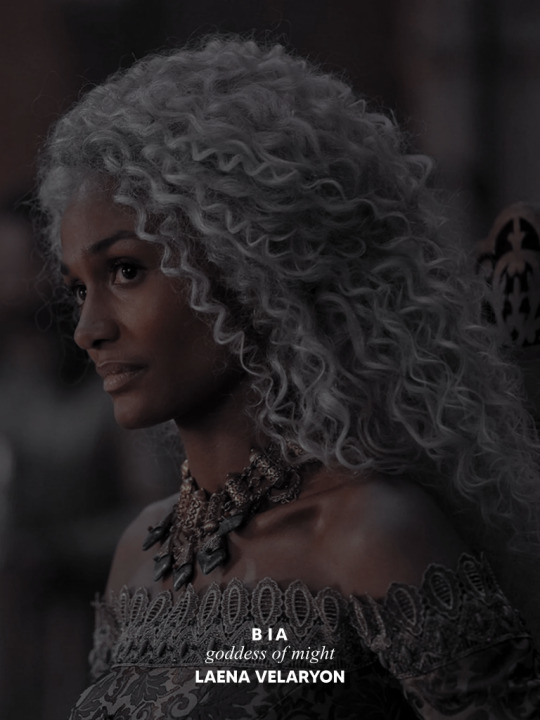
WOMEN from HOUSE OF THE DRAGON as GREEK GODDESSES
rhaenys as athena // rhaenyra as niké // alicent as nemesis // baela as aglaia // helaena as themis // baela as artemis // aemma as eileithyia // mysaria as pheme // laena as bia
#starkslydia#hotd#house of the dragon#rhaenys targaryen#rhaenyra targaryen#alicent hightower#baela targaryen#helaena targaryen#rhaena targaryen#aemma arryn#mysaria#laena velaryon#greek mythology#greek mythology au
1K notes
·
View notes
Text
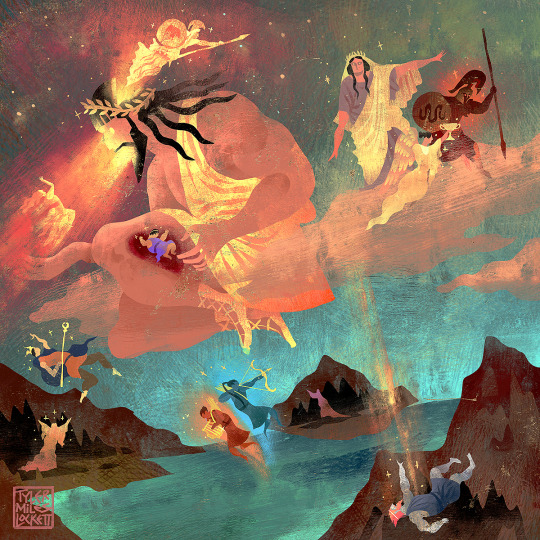
Protogenoi 9: Zeus Offspring Olympians
In addition to the previous deities, Zeus’ offspring become the remaining Olympians. Here we will explore their fascinating birth tales. In the following pages we will look at each of the Olympians in detail.
Zeus and Metis, the titan of wisdom. Fearing a prophecy of his son overthrowing him (just like he overthrew his father, Cronus) he swallows his 1st wife. But the child, Athena, goddess of wisdom and military strategy, erupts from Zeus head fully armed in war glory.
Zeus and Leto, goddess of child birth and motherhood. Fearing Zeus wife Hera, Leto escapes to the floating island of Delos to give birth to the twin gods Apollo and Artemis.
Zeus and Hera, give birth the Ares; god of war, as well as Hebe, goddess of Youth, cupbearer to the gods, and later wife to Heracles, and Eileithyia, goddess of childbirth.
Hera, jealous at Zeus’ sole conception of Athena from his head, conceives her own child, the lame-legged Hephaistos. Dissapointed with his disability, she casts him out off Olympus and he falls to the island of Lemnos, and becomes an ingenious craftsman under the parentage of sea nymphs Thetis and eurynome.
Zeus and Semele: Hera, in her jealousy persuades pregnant mortal Semele to convince Zeus to reveal his true form to her. But when he does, it incinerates her, and Zeus takes the unborn Dionysus into his thigh for the remainder of the pregnancy.
Zeus and Maia, who is one of the seven sister Pleaides who were associated with springtime and the constellations. Maia gave birth to Hermes in a cave on Mount Cyllene in Arcadia.
#pagan#hellenism#greek mythology#tagamemnon#mythology tag#percyjackson#dark academia#greek#greekmyths#classical literature#percy jackon and the olympians#pjo#homer#iliad#classics#mythologyart#art#artists on tumblr#odyssey#literature#ancientworld#ancienthistory#ancient civilizations#ancientgreece#olympians#greekgods#zeus#demeter#persephone
315 notes
·
View notes
Text
you know what's really interesting is that by the rules of ancient Greek onomastics and their anglicizations via Latin, Mesperyian should be a masculine name (Mesperyianos/Μεσπερυιανός), formed by adding the adjectival suffix -νός, -νή, -νόν to indicate that the bearer had something to do with a 'Mesperyia' (Μεσπέρυια), since -yia (-υια) is a common feminine ending found on perfect active participles as well as the proper names of several minor goddesses and nymphs (e.g. Eileithyia, Idyia). I might further conjecture that this name is a corruption of 'Hesperyia' (´Εσπέρυια), perhaps connected to a dialectical variant, and that this name referred to a goddess of the evening star, which is otherwise usually imagined in Greek myth as male. 'Mesperyian' thus probably reflects the attempt of the people who considered the evening star female and referred to her as 'Mesperyia' to accommodate other Greek-speaking peoples' perception of the evening star as male: they gave the male evening star a masculinized version of their feminine name for it, 'Mesperyianos.' however the shift in the grammatical gendering of the name seems not to have been accompanied by a shift in the perception of the gender of the evening star itself; thus the evening star comes to be referred to, as a woman, with a male version of her earlier name. in this essay i will
#linguistics folks where in the mediterranean could i pick up a stray initial mu#if you saw me post a version of this earlier no you didnt#mine
96 notes
·
View notes